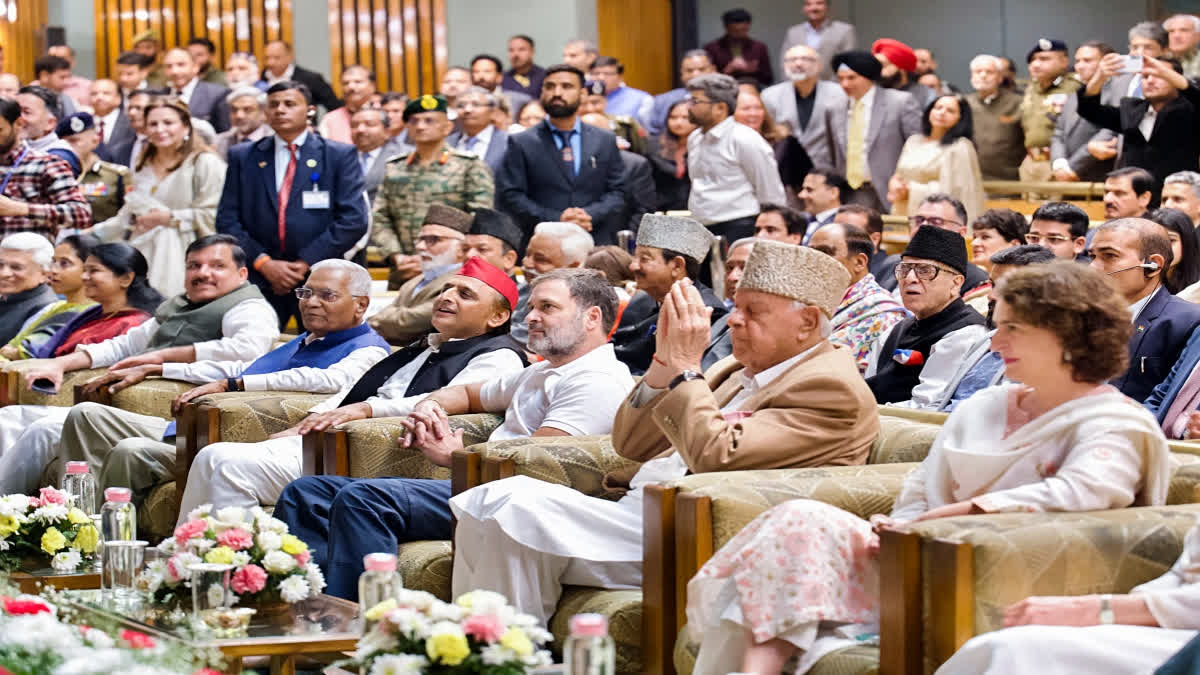Srinagar: Lack of consensus over the single ministerial berth has forced Congress to stay out of the Jammu and Kashmir government, ETV Bharat learnt from multiple sources.
The Congress contested the Jammu and Kashmir Legislative Assembly election in alliance with the National Conference (NC), which dominated the polls by winning 42 seats, including seven from Jammu.
Contrarily, the Congress secured just six seats, suffering a significant defeat in its stronghold of Jammu, where it was expected to perform well. The party managed to win only one seat out of the total 43 in the region, marking its worst performance in the last nine assembly elections.
Notably, the NC received support from five independent legislators, allowing it to comfortably cross the majority mark required to form a government, even without the Congress's six seats. Given its poor showing, the Congress lost bargaining power forcing the party to settle for a single ministerial portfolio in the government led by Omar Abdullah.
“The National Conference had offered Congress one ministerial berth in the cabinet,” a source revealed. “However, Congress lacked internal consensus as there were two or three contenders for the position.”
J&K Congress chief Tariq Hameed Karra along with former state presidents Ghulam Ahmad Mir and Peerzada Sayeed were considered the probable candidates for the ministerial post. The internal disagreement prompted the Congress high command in Delhi to direct the local unit to offer external support to the government until the issue is resolved.
Interestingly, Congress president Mallikarjun Kharge, leader of opposition in Lok Sabha Rahul Gandhi and Congress general secretary Priyanka Gandhi Vadra attended the swearing-in ceremony in Srinagar. Hours before Omar Abdullah was set to take over as the first Chief Minister of Jammu and Kashmir union territory since the abrogation of Article 370 in 2019, local Congress leaders linked their refusal to take the oath to the demand with the restoration of statehood. Instead, they chose to offer external support to the government.
Abdullah learnt about Congress’s decision not to join the council of ministers a day before the oath-taking ceremony. The 54-year-old third-generation politician from the Abdullah family took the oath as Chief Minister alongside his five cabinet colleagues at the Sher-e-Kashmir International Convention Centre on the banks of Dal Lake, marking the first elected government in Jammu and Kashmir since 2018 when the PDP-BJP coalition collapsed.
Abdullah’s cabinet includes three ministers from Jammu and two from Kashmir, addressing concerns about Jammu’s underrepresentation in the government. According to the Reorganisation Act, which governs Jammu and Kashmir, the cabinet cannot exceed 10% of the total 90-member assembly. This meant the Abdullah-led government could have a maximum of eight ministers excluding the Chief Minister.
The two ministers from Kashmir are Sakina Itoo, representing Damhal Hanjipora in south Kashmir and Javid Dar from Rafiabad in north Kashmir. Jammu’s representation is significant as the four districts comprising Jammu, Udhampur, Kathua, and Samba gave an overwhelming mandate to the Bharatiya Janata Party, securing 29 seats.
Surinder Choudhary, who defeated BJP state president Ravinder Raina in Nowshera, was appointed Deputy Chief Minister. Additionally, Javed Rana from Mendhar in the Pir Panjal region and independent candidate Satish Sharma from Chamb were also included in the cabinet.
There are still three vacant cabinet positions with one likely to go to Jammu's Chenab region. The remaining two positions, according to sources privy to the government formation, are expected to go to one candidate from Kashmir and one reserved for Congress once it reaches a consensus.
Read more:



